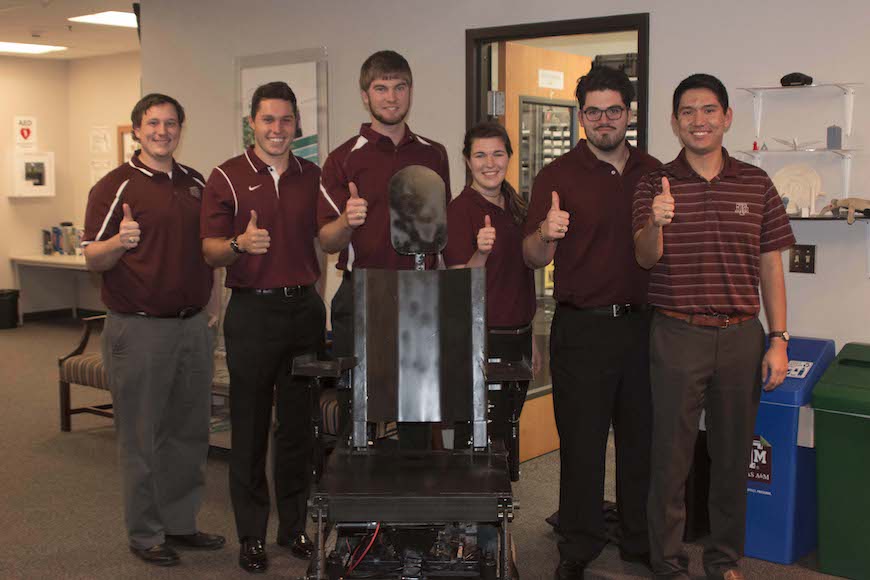
In search of ways to make life a little easier for a College Station resident, six mechanical engineering seniors at Texas A&M University devoted their senior capstone design project to improving and upgrading a wheelchair.
The team’s goal was to develop a fully functioning mechanical chair, mostly from scratch, while applying lessons they learned in the classroom to a real-world scenario. Over the course of the year, students were expected to learn, synthesize and develop skills of the engineering practice, while also working as a team.
“At the end of the day our team knew we were helping someone create a better quality of life, and that is always the driving factor behind our decisions,” said team member Clare McDougall. “We are all touched and proud to have the opportunity to give back to a fellow community member in such a significant way.”
The Wheelchair Design Team consisted of all senior mechanical engineering majors — McDougall, Andres Alvarado, Lane Garner, Jacob Garner, Miguel Hoffmann and Tristen Tinar. All of the students expect to graduate in December.
The team first met with their sponsor, who requested to remain anonymous, in the spring to review the specific needs for the team to address in the redesign. The students then broke the chair down into four areas: leg supports, arm supports, base and the seat/backrest system.
“The chair had to perform basic functions like recline/incline, adjust in various ways to accommodate for their measurements, and fit under tables and in doorframes. Some requirements were more specific relating to how he/she opens doors and how he/she will enter/leave the chair,” McDougall said.
In the initial brainstorming for a basic design, team members researched design ergonomics, existing patents and alternative designs for the chair. McDougall said the team based their idea for their reclining mechanism from a La-Z Boy chair.
After brainstorming, the team began modeling the design. Team members had to learn how to budget their time for the process of planning, designing, receiving feedback and redesigning until they created a satisfactory model.
“This process requires an immense amount of planning and time management, which isn’t necessarily what’s on the forefront of people’s minds when they enter their senior year,” McDougall said.
“Prototyping was never meant to easy; it is meant to be a tedious, iterative and often frustrating process,” said Alvarado. “But in the end, it is extremely rewarding to see the final working product.”
Alvarado said the students were challenged with balancing course expectations with the reality of the project, which did not always align.
“Ultimately, our team’s goal is not attempting to apply all concepts learned in the classroom to our project, but rather delivering a finished, operational and safe wheelchair to our client,” Alvarado said. “Along the way we do our best to match the criteria of the course with the nature of our project.”
McDougall said she has taken away lessons in how to take and respond to constructive criticism, as well as how to work as a team over the last two semesters. Alvarado said there has been a transformation of sorts after the students met in the spring, each with their respective critical thinking mindsets, problem solving skills and mass of engineering knowledge.
By working in the machine lab building the pieces of the chair from scratch, Alvarado said the team also honed skills that could not be learned in the classroom.
“But in the context of tackling our first full-blown engineering project, we had little experience in effectively communicating, practicing integrity and dealing with conflict. Fast-forwarding to now, each one of us has seen immense growth in those areas. These are the types characteristics that matter at the end of the day in the professional engineering world, rather than just the pure technical expertise gained from our project,” Alvarado said.
For more information about the senior capstone design program or to sponsor a future capstone project, email Dr. Joanna Tsenn.